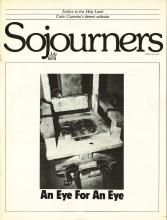On many occasions I have found myself in a room filled with people talking over our responsibility to seek social justice for the poor and oppressed, when suddenly I am overwhelmed by the absurdity and irony of our discussion. I look around the circle only to see my own image mirrored back to me a dozen times. The room is filled with white, middle- and upper-middle class persons whose brows are firmly wrinkled as evidence of the deep sincerity of their commitment to minority rights and racial justice.
The simple truth is that we find it easier to talk favorably about the poor than to be with them. We are overflowing with information regarding the oppressed, but we rarely make access for needy persons into our lives.
In these roundtable discussions I am continually surprised by the fact that we seldom consider the most important model for relating to the poor and oppressed around us -- the life of Jesus. The process which has been labeled "discipline" stresses the production of a new generation of mini-evangelists rather than Jesus and his ministry.
Jesus was not one to come into our circles of concern and lay down a "heavy rap" on poverty. Instead, Jesus was poor. He shared his bread with others like him and chatted at the well with folks who were in need.
From his birth in a stable to his life as an itinerant rabbi, Jesus was a poor man. From the offering for purification made for him by his parents (a pair of turtledoves, or two young pigeons), to the triumphant entry into Jerusalem on a donkey, Jesus is identified as being one with the dispossessed. It is this message -- that Jesus came specifically for the poor and the oppressed -- which is missing not only in our sermons and discussions, but also in the way we live.
Read the Full Article

